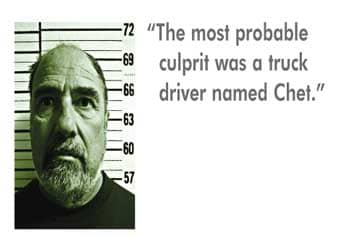Max Morgan always thought employee theft was something that happened to others – until it happened to him.
Prevent Employee Theft by James W. Bassett
Max Morgan, owner of Morgan’s Furniture Gallery, was stunned. Three of his most expensive bedroom sets, two entertainment centers and three sofas were missing from his warehouse. He double-checked his computer and physical inventories. This was no mistake. It had to be employee theft. The only people who had access to the warehouse were Morgan’s employees.

Max Morgan never had an employee theft problem in his company before. He called the police. A uniformed officer promptly arrived and took a report. The next day, a detective showed up and interviewed Max. The detective told him they had run criminal record checks on all his employees, but none had criminal records. The detective explained that since there was no physical evidence and no witnesses to interview, there was little the police could do. He went on to explain that police were not eager to investigate employee theft cases because when police did catch the perpetrators, their employers usually decided not to prosecute. This made police feel they had wasted their time. The detective said their first priority was investigating crimes against persons. He also said “The truth is that we don’t have enough manpower. Property crimes like yours usually get moved to the back burner.”
Max decided to go a different route and have all his employees take polygraph examinations. He grabbed the phone book, opened it to “Lie Detection” and called a private polygraph examiner. The polygraph examiner told Max that, because of a federal law called the Employee Polygraph Protection Act of 1988 (EPPA), he could not ask any of his employees to take polygraph tests unless two requirements were met. The requirements are: 1) the employee must have had access to the stolen customer property, and 2) Max had to have what is called “reasonable suspicion” that the employee stole what was missing.
The more questions Max asked, the more confusing the polygraph examiner’s answers became – and the more frustrated Max became. Max thanked the polygraph examiner and hung up.
Max decided to try an internet search using the search term “Solve Employee Theft.” The first three search results all referred him to the same web site and the same investigator. Max went to the website and studied it carefully. He believed he might have found the solution to his problem. And it was entirely legal.
According to the website, Max would order theft investigation questionnaires (written interviews) for each of his warehouse employees.
He would administer the questionnaires like tests to his warehousemen and their supervisor. Then Max would mail the completed questionnaires back to the investigator. The investigator would analyze each employee’s answers and write a report explaining which employees Max could legally ask to take polygraph tests in compliance with the EPPA law. The investigator’s report would also advise Max regarding which qualified employees should be asked to take the polygraph first, second, third, etc., based on who was most likely to have committed the theft. Then the investigator would fill out the paperwork required so that each qualified employee could be legally asked to take a polygraph test.
Max got the investigator on the phone and asked “What is your success rate in solving theft cases with these questionnaires?” The investigator answered “In cases like yours, ninety-five percent. But I can’t guarantee you will get your merchandise back.” Max said “I understand that. My first priority is finding out who stole my furniture and getting rid of that person.”

Max ordered the theft investigation questionnaires and received them promptly via email. That afternoon, he administered theft questionnaires to his employees and sent them back to the investigator by overnight mail.
Two days later, Max was reading a report that had been emailed from the investigator with results for each of his warehouse employees. An attachment contained completed forms so Max could ask his number one most likely suspect to take a polygraph examination in compliance with the EPPA law.
According to the employees’ answers on their questionnaires, the most probable culprit was a truck driver named Chet. Chet was one of Morgan’s four delivery drivers. A close runner-up to Chet as the most probable culprit was Nathan, his warehouse foreman. The investigator seemed to think the two of them might be working in cahoots.
Max Morgan couldn’t believe his warehouse supervisor was involved. Nathan was the first employee Max ever hired and he was the last person Max would have ever suspected of stealing from him. But the information in the report was pretty clear.
Here’s some of what the report said regarding Chet’s involvement in the theft:
Chet’s helper, Scott, wrote on his questionnaire, “Chet told me he got charged with drunk driving two months ago. He said he had the money to make bond but didn’t have the money for his lawyer’s retainer. He told me if he didn’t come up with the scratch for the lawyer, he would get convicted of DUI and lose his job.”
Freddy, a warehouseman wrote: “Chet’s been acting real up-tight lately, not like his usual self which is kidding around with all of us and joking.”
Marcel, a delivery driver, wrote: “Something’s not right with Chet. It seems like he and Nathan are always having these private conversations in the corner of the warehouse. It hasn’t been very long since the two of them didn’t like each other – hardly even spoke to each other. Now, all of a sudden, it’s like they’re buddy-buddy.”
Here’s what the investigator’s report said about Nathan:
Tom, a delivery driver, wrote: “I hope I’m wrong, but maybe something’s going on with Nathan and Chet. Every day for the last two weeks, Nathan’s been sending out Chet’s truck last. Before that, it was whoever’s truck was loaded first was the one that left first. Chet and Scott used to get their truck loaded first almost every day. Scott liked to finish early. Now, he don’t much seem to care. I’m trusting that you’ll keep my name out of it.”
Alvin, a delivery driver, wrote: “Last year Nathan bought a new house and a new car. Not long ago, his wife got laid off. Now Nathan’s saying he’s gotta have a raise.”
George, a touch-up man, wrote: “Just this Monday, Nathan came into my area, took an entertainment center with a big scratch on it, and loaded it on Chet’s truck. He told me he’d touch it up himself at the customer’s house. When I asked why he was going out with Chet, he said they had to make a special delivery after working hours. Very strange. Never happened before since I been here that Nathan went out on a delivery.”
Along with the theft investigator’s report, Max received completed forms so he could legally request Chet and Nathan to take polygraph exams in compliance with the EPPA law. The investigator advised presenting the forms to Chet first. He thought Chet might prove more cooperative than Nathan.
Max called Chet into his office, closed the door and said, “Chet I want you to read these two forms carefully. If you have questions about anything you read, let me know.”
Chet read the forms slowly and deliberately. Then he said “These forms say I don’t have to take the polygraph test if I don’t want to. I can refuse.”
Max asked, “Why would you think about refusing if you are innocent?”
Chet said “I have to protect my rights.”
Max responded “And I have to protect the company. Did you read the part that says I have the right to fire you if you refuse to take the polygraph test?”
Chet said, “Yes. Would you do that?”
Max said “Tell me about the furniture that’s missing from my warehouse. Maybe it’s not all your fault. If not, you shouldn’t take all the blame.”
Chet turned away from Max and stared at the wall. His eyes began to get misty. Then he began to get angry.
Chet said, “It wasn’t my idea. It was Nathan’s. Nathan found out I got a DUI last month. He said I could beat the rap with a good lawyer. I asked if he was going to loan me the money. Nathan said he had something better in mind. He explained how we could overload my truck and that we could deliver the extra furniture to the houses of various guys he knew. He said if I didn’t show my helper the invoices, then Scott would never catch on to us. Nathan said we’d split the money he’d get from selling the furniture 50-50.”
Max said “I understand why you stole. Why did Nathan steal? Did he get behind on his payments? Did his wife lose her job?”
Chet said “Heck no! Well, his wife did lose her job, but the very next week she found a better one. His problem is that he developed a liking for nose candy. Can’t get enough of it.”
Max asked “Cocaine?”
Chet said “Yup! He does two lines every day at lunch. He’s got a buzz on right now.”
Max said “You’re a good worker. I wouldn’t have fired you for the DUI. I would have moved you to a helper’s job and trained one of the helpers to drive your truck.”
Chet said “What happens now?
Max pulled out the blank Apology Form the investigator had sent to him via email, handed it to Chet and said, “Here, fill this Apology Form out completely and truthfully. Don’t hold anything back. Then sign your name.
I can’t promise you anything, but maybe something can be worked out to keep you out of jail and help you find another job somewhere. You may also have to testify against Nathan.”
Chet said “Why not? He’s the one that got me into this mess. And he hasn’t paid me my share.”
Chet wrote and signed his apology (i.e., a confession) and provided Max with the addresses where the stolen furniture had been delivered. Because Max had a signed confession from one of his employees and information concerning the locations of the stolen furniture, the police agreed to assist with search warrants and arrests.
Both Chet and Nathan are currently awaiting trial on Grand Larceny charges. Nathan was also charged with possession of cocaine. The police managed to recover all of the stolen furniture except for one sofa.
In today’s world, hurricane damage, recession, inflation and home mortgage foreclosures are just a few of the things driving American workers to steal from their employers. Some are also seeking solace in illegal drugs.
Max Morgan always thought employee theft was something that happened to others – until it happened to him.
James W. Bassett has been a theft investigator and polygraph examiner for more than three decades. His new book, Solving Employee Theft: New Insights, New Tactics is available from Booksurge.com, Amazon.com and from the author himself. You can contact him via email at JBassett@furninfo.com, or visit his website www.TheftStopper.com to learn more about theft investigation questionnaires.